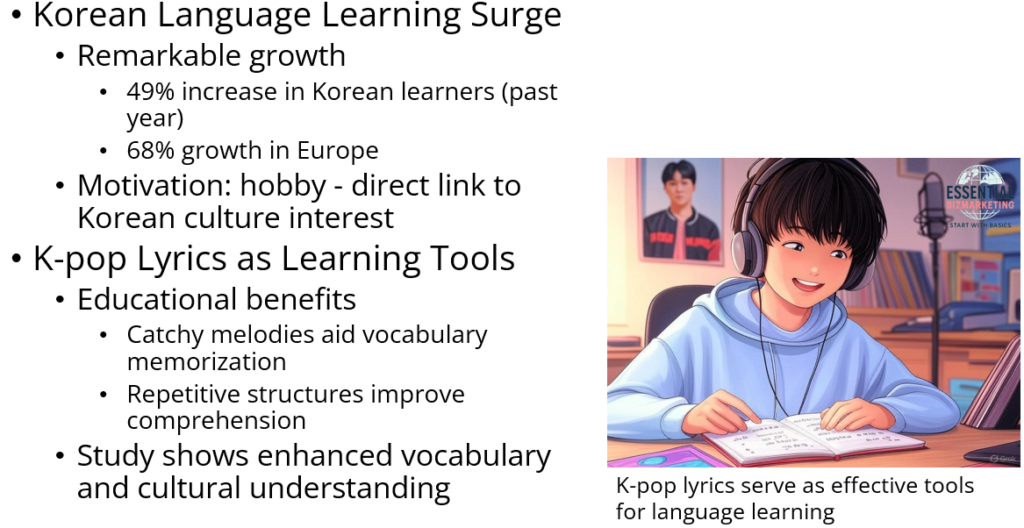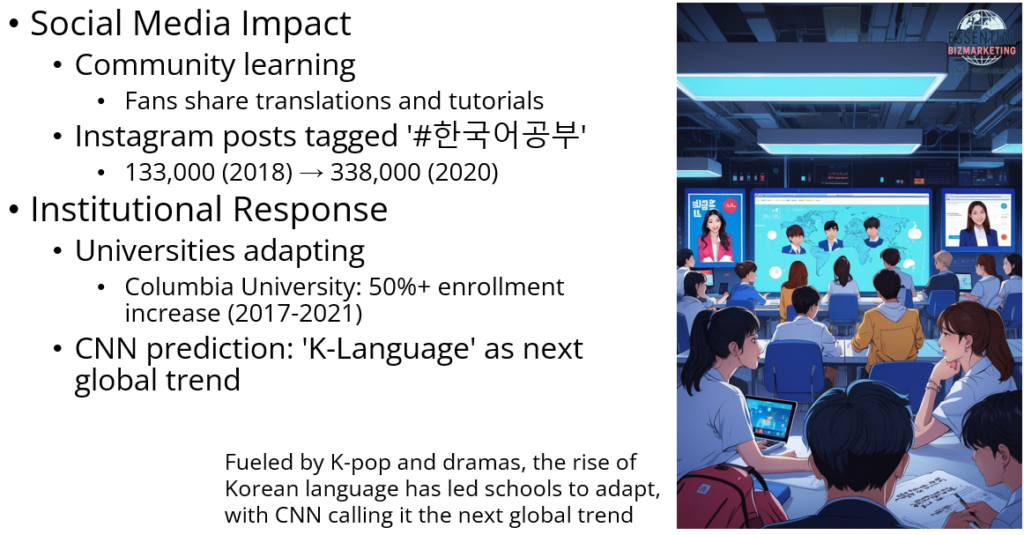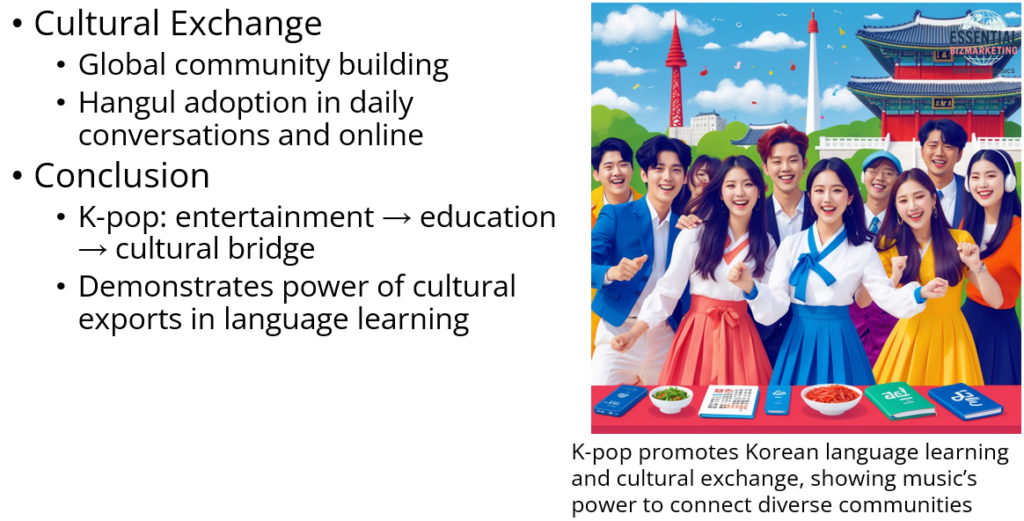The global surge in K-pop’s popularity has not only captivated music enthusiasts but has also sparked a significant interest in learning the Korean language. This phenomenon highlights the profound connection between music and language acquisition, demonstrating how cultural exports can influence educational pursuits worldwide.

The Rise of Korean Language Learners Inspired by K-pop
The allure of K-pop has led to a remarkable increase in individuals seeking to learn Korean. For instance, a study by Preply revealed that the number of Korean language learners has surged by 49% in the past year, surpassing the average growth rate of other languages by 9%. This trend is particularly notable in Europe, where there has been a 68% increase in students learning Korean. The primary motivation for these learners is ‘hobby,’ indicating a direct correlation between interest in Korean culture and the desire to learn the language.
Utilizing K-pop Lyrics as Educational Tools
K-pop lyrics serve as effective tools for language learning. The catchy melodies and repetitive structures make it easier for learners to memorize vocabulary and understand sentence structures. A study focusing on intermediate female marriage immigrants demonstrated that incorporating K-pop into Korean language lessons enhanced vocabulary acquisition and cultural understanding, thereby improving overall communication skills.
The Role of Social Media in Language Learning

Social media platforms have become instrumental in facilitating Korean language learning. Fans worldwide share translations, create tutorials, and engage in discussions about K-pop lyrics, fostering a global learning community. For example, on Instagram, posts tagged with ‘#한국어공부’ (studying Korean) increased from 133,000 in 2018 to 338,000 in 2020, reflecting the growing interest in learning the language.
Institutional Responses to the Growing Demand
Educational institutions have recognized this trend and are adapting accordingly. Universities have reported significant increases in Korean language course enrollments. For instance, Columbia University’s Korean language program experienced a more than 50% increase in enrollment between 2017 and 2021. This surge is largely attributed to the influence of K-pop and Korean dramas, leading media outlets like CNN to predict that ‘K-Language’ could be the next global trend following K-pop and K-dramas.
Cultural Exchange and Global Community Building

The interest in K-pop has transcended language learning, fostering cultural exchange and global community building. Fans from diverse backgrounds come together to share their passion, leading to a deeper understanding and appreciation of Korean culture. This cultural immersion has also contributed to the spread of Hangul, the Korean writing system, with fans incorporating Korean phrases into their daily conversations and online interactions.
Conclusion
The influence of K-pop extends beyond entertainment, playing a pivotal role in promoting Korean language learning and cultural exchange. By engaging with K-pop, learners not only acquire a new language but also immerse themselves in a rich cultural experience, exemplifying the power of music as a bridge between diverse communities.
📚 References
Hwang, S. (2020). The use of K-pop in teaching Korean language. International Conference ICT for Language Learning. Retrieved from https://conference.pixel-online.net/files/ict4ll/ed0014/FP/7613-TST5329-FP-ICT4LL14.pdf
Kang, J. (2023, October 29). The status of the Korean language in the U.S.: After K-pop and K-drama, now comes K-language. Korea Daily. Retrieved from https://www.koreadaily.com/2023/10/29/society/generalsociety/20231029190522686.html
(Original title: 미국 속 한국어 위상…K팝·K드라마 이어 이제는 ‘K랭귀지’) [In Korean]
MacDonald, J. (2019, September 1). How K-pop and K-drama made learning Korean cool. Forbes. Retrieved from https://www.forbes.com/sites/joanmacdonald/2019/09/01/how-k-pop-and-k-drama-made-learning-korean-cool/
Kim, S. J. (2014). Teaching Korean through K-pop: A strategy for intermediate-level marriage migrant women. Master’s thesis, Korea National University of Education. Retrieved from https://scienceon.kisti.re.kr/srch/selectPORSrchArticle.do?cn=DIKO0015669611
(Original title: 케이팝(K-pop)을 활용한 한국어 학습 지도 방안: 중급 여성결혼이민자를 중심으로) [In Korean]
90 Day Korean. (n.d.). Learn Korean with K-pop: Mastering Hangeul through music. Retrieved from https://www.90daykorean.com/learn-korean-with-kpop/
Lee, J. (2020, October 21). Spreading Hangul worldwide through K-pop and the Korean Wave. Radio Free Asia. Retrieved from https://www.rfa.org/korean/weekly_program/culture_talk/openculture-10212020093853.html
(Original title: K팝 등 한류와 함께 전 세계로 한글 확산) [In Korean]
Lee, W. (2020, June 24). Wona Lee on the impact of K-pop in Korean language learning. impactmania. Retrieved from https://www.impactmania.com/im/wona-lee-on-the-impact-of-k-pop-in-korean-language-learning/
Newswire. (2022, December 15). The popularity of K-pop and Korean dramas fuels Korean language learning. Newswire Korea. Retrieved from https://www.newswire.co.kr/newsRead.php?no=990124
Park, Y. (2022, November 1). How is K-pop promoting the Korean language and Hangul? Hangul Culture Solidarity. Retrieved from https://www.urimal.org/4128
(Original title: 케이팝은 어떻게 한국어와 한글을 알리고 있을까?) [In Korean]
📁 Start exploring the Blog
📘 Or learn more About this site
🧵 Or follow along on X (Twitter)
🔎 Looking for sharp perspectives on global trade and markets?
I recommend @GONOGO_Korea as a resource I trust and regularly learn from.
